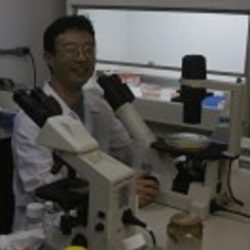
SILVIA BEATRIZ BOSCARDIN
Phone: +55 (11) 3091-7263
Room: 46
Email: sbboscardin@usp.br
Currículo Lattes
Personal site: http://www.researcherid.com/rid/C-3397-2012
GROUP MEMBERS

Elaine Cristina Matos Vicentin
- Posdoctoral
- elaine.vicentin@usp.br
- +55 (11) 3091-7263

Kelly Nazaré da Silva Amorim
- PhD Student
- kellyamorin@hotmail.com
- +55 (11) 3091-7263

Marcio Massao Yamamoto
- Laboratory Technician
- masayama@usp.br
- +55 (11) 3091-7263

Raquel Hoffmann Panatieri
- PhD Student
- rachpp@yahoo.com.br
- +55 (11) 3091-7263
RESEARCH LINE
Targeting pathogen-derived antigens to dendritic cells in vivo: a new strategy for vaccine development
PUBLICATIONS
IFN-gama-Induced Priming Maintains Long-Term Strain-Transcending Immunity against Blood-Stage Plasmodium chabaudi Malaria. The Journal of Immunology (1950). , v.191, p.5160 – 5169, 2013
Targeting the Non-structural Protein 1 from Dengue Virus to a Dendritic Cell Population Confers Protective Immunity to Lethal Virus Challenge. PLoS Neglected Tropical Diseases (Online). , v.7, p.e2330 – , 2013
TLR5-dependent immunogenicity of a recombinant fusion protein containing an immunodominant epitope of malarial circumsporozoite protein and the FliC flagellin of Salmonella Typhimurium. Memórias do Instituto Oswaldo Cruz (Impresso). , v.106, p.167 – 171, 2011
Direcionando proteínas derivadas de patógenos para células responsáveis pela ativação da resposta imune. Revista da Biologia. , v.6b, p.12 – 16, 2011
CD4+CD25+Foxp3+ Regulatory T Cells, Dendritic Cells and Circulating Cytokines in Uncomplicated Malaria: Do Different Parasite Species Elicit Similar Host Responses?. Infection and Immunity (Print). , v.78, p.4763 – 4772, 2010
CD8+ T cell adjuvant effects of Salmonella FliCd flagellin in live vaccine vectors or as purified protein. Vaccine (Guildford). , v.28, p.1373 – 1382, 2010
Chagas’ disease: an update on immune mechanisms and therapeutic strategies. Journal of Cellular and Molecular Medicine (Print). , v.14, p.1373 – 1384, 2010
Immunogenicity and protective efficacy of a recombinant yellow fever vaccine against the murine malarial parasite Plasmodium yoelii. Vaccine (Guildford). , v.28, p.4644 – 4652, 2010
Impaired Innate Immunity in Tlr4-/- Mice but Preserved CD8+ T Cell Responses against Trypanosoma cruzi in Tlr4-, Tlr2-, Tlr9- or Myd88-Deficient Mice. PLoS Pathogens (Online). , v.6, p.e1000870 – , 2010
Poly(I:C) is an effective adjuvant for antibody and multi-functional CD4+ T cell responses to Plasmodium falciparum circumsporozoite protein (CSP) and anti-DEC-CSP in non human primates. Vaccine (Guildford). , v.28, p.7256 – 7266, 2010
Identification of antigen-presenting dendritic cells in mouse aorta and cardiac valves. Journal of Experimental Medicine. , v.206, p.497 – 505, 2009
Immunologically relevant strain polymorphism in the Amastigote Surface Protein 2 of Trypanosoma cruzi. Microbes and Infection. , v.9, p.1011 – 1019, 2007
Antigen targeting to dendritic cells elicits long-lived T cell help for antibody responses. Journal of Experimental Medicine. , v.203, p.599 – 606, 2006
The circumsporozoite protein is an immunodominant protective antigen in irradiated sporozoites. Nature (London). , v.444, p.937 – 940, 2006
The non-palindromic adaptor-PCR method for the identification of the T-cell receptor genes of an interferon-g-secreting T-cell hybridoma specific for trans-sialidase, an immunodominant Trypanosoma cruzi antigen. Brazilian Journal of Medical and Biological Research. , v.39, p.345 – 354, 2006
CD8+-T-cell-dependent control of Trypanosoma cruzi infection in a highly susceptible mouse strain after immunization with recombinant proteins based on amastigote surface protein 2. Infection and Immunity. , v.73, p.6017 – 6025, 2005
Protective immunity against Trypanosoma cruzi infection in a highly susceptible mouse strain after vaccination with genes encoding the amastigote surface protein-2 and trans-sialidase. Human Gene Therapy. , v.15, p.878 – 886, 2004
A DNA-priming protein-boosting regimen significantly improves type 1 immune response but not protective immunity to Trypanosoma cruzi infection in a highly susceptible mouse strain. Immunology and Cell Biology. , v.81, p.121 – 129, 2003
Immunization with cDNA expressed by amastigotes of Trypanosoma cruzi elicits protective immune response against experimental infection. Infection and Immunity. , v.71, p.2744 – 2757, 2003
Importance of CD8 T cell-mediated immune response during intracellular parasitic infections and its implications for the development of effective vaccines. Anais da Academia Brasileira de Ciências. , v.75, p.443 – 468, 2003
CD4 Th1 but not CD4 Th2 clones efficiently activate macrophages to eliminate Trypanosoma cruzi through a nitric oxide dependent mechanism.. Immunology Letters. , v.73, p.43 – 50, 2000
Heterologous expression of Trypanosoma cruzi surface glycoprotein (gp82) in mammalian cells indicates the existence of different signal sequence requirements and processing. The Journal of Eukaryotic Microbiology. , v.46, p.557 – 565, 1999
Heterologous expression of Trypanosoma cruzi surface glycoprotein (gp82) indicates that requirements for glycosylphosphatidyl-inositol anchoring are different in mammalian cells and in trypanosome. Memórias do Instituto Oswaldo Cruz. , v.94, p.527 – 530, 1999
Organization and expression of a multigene family encoding the surface glycoproteins of Trypanosoma cruzi metacyclic trypomastigotes involved in the cell invasion. Memórias do Instituto Oswaldo Cruz. , v.94, p.169 – 171, 1999
Targeting a Plasmodium vivax merozoite surface protein 1 fragment to the DEC205+ dendritic cell population elicits strong antibody and T cell responses.. Frontiers in Immunology. , v.4, p.abstract – , 2013
Targeting the Plasmodium chabaudi MSP-1(19) protein to the DEC205 dendritic cell population induces faster parasite clearance. Frontiers in Immunology. , v.4, p.abstract – , 2013
Influence of different adjuvant formulations in humoral responses after immunization with a HIV envelope glycoprotein trimer. Frontiers in Immunology. , v.4, p.abstract – , 2013
A triple positive staining to capture B cells expressing anti-tetanus toxoid IgG in human blood. Frontiers in Immunology. , v.4, p.abstract – , 2013
Placental lesions as result of TLR4 activation by Plasmodium berghei are associated with low birth weight. Frontiers in Immunology. , v.4, p.abstract – , 2013
Anti-DEC-205 receptor carrying P10 induces protective response in experimental Paracoccidioidomycosis. Frontiers in Immunology. , v.4, p.abstract – , 2013
In Vivo Approaches Reveal a Key Role for DCs in CD4+ T Cell Activation and Parasite Clearance during the Acute Phase of Experimental Blood-Stage Malaria. PLoS Pathogens (Online), v. 11, p. e1004598, 2015
Antigen Targeting to Dendritic Cells Allows the Identification of a CD4 T-Cell Epitope within an Immunodominant Trypanosoma cruzi Antigen. Plos One, v. 10, p. e0117778, 2015
The dengue virus non-structural 1 protein: Risks and benefits. Virus Research (Print). , v.181, p.53 – 60, 2014
Parenteral Adjuvant Effects of an Enterotoxigenic Escherichia coli Natural Heat-Labile Toxin Variant. Frontiers in Immunology (Online). , v.4, p.487 – , 2014
MyD88 Signaling is Directly Involved in the Development of Murine Placental Malaria. Infection and Immunity (Print). , v.82, p.830 – 838, 2013
Capítulos de livros publicados
Recent advances in vaccine development against malaria caused by Plasmodium falciparum In: Plasmodium falciparum: Morphology, Life Cycle and Health Impact.1 ed. Hauppauge, NY : Nova Publishers, 2012, v.1, p. 1-56
Vaccines based on dendritic cell biology. In: New Generation Vaccines.4 ed.New York : Informa Healthcare, 2009, v.1, p. 327-339
RESEARCH PROJECTS/FUNDING
COLLABORATORS
Brazilian Collaborators
- Prof. Dr. Luís Carlos de Souza Ferreira | ICB/USP, São Paulo
- Prof. Dr. Claudio Romero Farias Marinho | ICB/USP, São Paulo
- Profa. Dra. Maria Regina D’Ímperio Lima | ICB/USP, São Paulo
- Prof. Dr. Marcelo Urbano Ferreira | ICB/USP, São Paulo
- Profa. Dra. Irene da Silva Soares | FCF/ USP, São Paulo
- Prof. Dr. Sandro Almeida | FCF/ USP, São Paulo
- Profa. Dra. Daniela Santoro Rosa | UNIFESP, São Paulo
- Prof. Dr. Fabio Trindade Maranhão Costa | UNICAMP, Campinas
- Prof. Dr. Daniel Mansur | UFSC, Florianópolis
- Prof. Dr. André Mansur | UFSC, Florianópolis
- Dra. Alda Alves | Fiocruz, Rio de Janeiro
- Dr. Juliano Bordignon | Fiocruz, Curitiba
- Dra. Ana Moro | Instituto Butantan, São Paulo
- Dra. Denise Tambourgui | Instituto Butantan, São Paulo
International Colaborators
- Dr. Michel Nussenzweig | The Rockefeller University, Estados Unidos
- Dr. Rogério Amino | Instituto Pasteur, Paris
- Dr. Robert Menard | Instituto Pasteur, Paris
- Dra. Hedda Wardemann | Instituto Max-Planck, Alemanha

